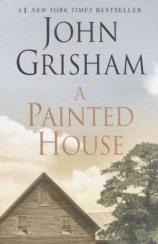Reading Group Guide
Discussion Questions
A Painted House: A Novel

1. Luke Chandler is exposed to events that many adults have never even seen. What is the effect of reading about these circumstances—from a difficult childbirth to the possibility of financial ruin—through the eyes of a seven-year-old narrator?
2. The Chandlers cannot afford some of the hallmarks of the1950s American dream, such as a television set or a stylish-looking car. Yet other aspects of that time period, such as the Korean War, make an unmistakable impression on them. How does the Chandler household measure up to your own memories or impressions of that era?
3. Several generations of women are presented in A Painted House, including Gran, Luke's mother, and Tally. How do contemporary women compare to those three characters?
4. Baseball is a central theme in the novel, providing Luke with heroes, dreams, and a diversion from the exhaustion of picking cotton. When the Arkansans challenge the Mexicans to a baseball game, however, Luke sees a darker side to competition. In what way does this scene foreshadow the conclusion of the novel?
5. How might the novel have been different if Luke's father or mother had narrated it?
6. How does your opinion of Cowboy change throughout the novel? What do you think attracts Tally to him? How did you react to his final showdown with Hank?
7. Discuss the role of Ricky in A Painted House. Though we never meet him directly, he does play a key part in the progress of the plot. What is the effect of his absence, and the letter writing it inspires? In what way does his experience differ from that of modern soldiers?
8. What keeps Pappy from giving up on farming?
9.What role do the Methodist and Baptist churches play in the Black Oak community? How well do religious teachings serve Luke during 1952?
10. In what way is Black Oak a snapshot of the world at large?
11. Luke says that most members of his community are descended from Scotch-Irish immigrants. What are some of the legacies of this ancestry?
12. The weather is a powerful force in A Painted House; floods, heat, hail, and tornadoes all add suspense to the novel. What is it like for the Chandlers to live at the complete mercy of the weather? How is their situation different from that of the cousins who perform indoor industrial work up north? What are the costs and benefits of relying on the natural world for your livelihood?
13. At the end of the novel, Luke and his parents become migrant workers themselves, venturing off to a new part of the country solely for employment opportunities. Twenty-first-century workers are often asked to transfer to a new part of the globe in order to further their careers. What is the best way to make decisions between financial security and family or cultural ties?
14. Poverty is a highly relative concept in A Painted House. Though they have no indoor plumbing and have perilously high debts, the Chandlers nonetheless give generously to those in need. How do you define "rich" and "poor"?
15. The Chandler house itself conveys a meaningful message. What is the significance of the way in which it gets painted? Do you believe that Pappy really does finish the job after Luke and his family leave? What is the effect of that detail? What causes Luke to set aside his dream of ordering a Cardinals jacket and instead use his meager earnings to buy paint?
16. In terms of plot and writing style, are any elements of John Grisham's legal thrillers evident in A Painted House?
17. Discuss your own coming-of-age story. What are your first memories of home? Who were the first people you loved?
18. A Painted House ends with tantalizing possibilities. Speculate about how Luke's life unfolds after his family leaves the Arkansas Delta.
A Painted House: A Novel
- Publication Date: February 3, 2004
- Paperback: 384 pages
- Publisher: Delta
- ISBN-10: 0385337930
- ISBN-13: 9780385337939








